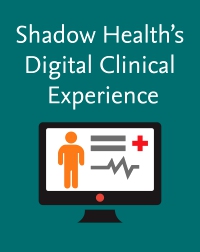
Mental Health Digital Clinical Experiences - Access Card, 1st Edition
Shadow Health - Access Card

Shadow Health’s Digital Clinical Experiences™ for Mental Health provide students with a safe, convenient, and dynamic environment to practice their documentation, communication, and clinical reasoning skills. An innovative conversation engine enables students to become more efficient in their patient interactions while maintaining high-quality therapeutic communication and care planning. These meaningful interactions help students gain valuable experience in practical application, patient communication, and personal empathy, empowering them to improve patient outcomes and prepare to enter clinical practice. Students will encounter patients with a variety of conditions, including schizophrenia, anxiety, depression, bipolar disorder, alcohol use disorder, and PTSD.
-
- Digital Standardized Patients™ vary in age, race, socioeconomic status, gender identity, and sexual orientation, and have health histories and diseases/disorders that support students’ mastery of nursing principles in a wide spectrum of medical situations.
- Natural language conversation engine allows students to engage in open-ended conversations with simulated patients to gather subjective data and practice patient-centered communication.
- Student Performance Index provides instructors and students with immediate, detailed feedback on six key components of clinical reasoning — subjective data collection, objective data collection, therapeutic communication, documentation, information processing, and self-reflection — to identify areas of strength and opportunities for remediation.
- Interview and Assessment activities allow students to demonstrate their clinical reasoning abilities by performing a health assessment on virtual patients to collect objective data and report their findings in the electronic health record.
- Care Plan exercises enable students to use assessment data to work through the steps of the ADPIE process and select appropriate care actions from a standard set of components.
- SBAR activities in many assignments give students the opportunity to practice interprofessional communication with their Preceptor, a physician, or other health care professionals appropriate to the simulation.
- Mental health assignments cover topics such as schizophrenia, anxiety, depression, bipolar disorder, alcohol use disorder, and PTSD.
- Mental health topics challenge students to use therapeutic communication techniques, perform mental status exams, and document the major physiological, psychological, emotional, and sociological changes experienced by adults with mental health issues.

 as described in our
as described in our 